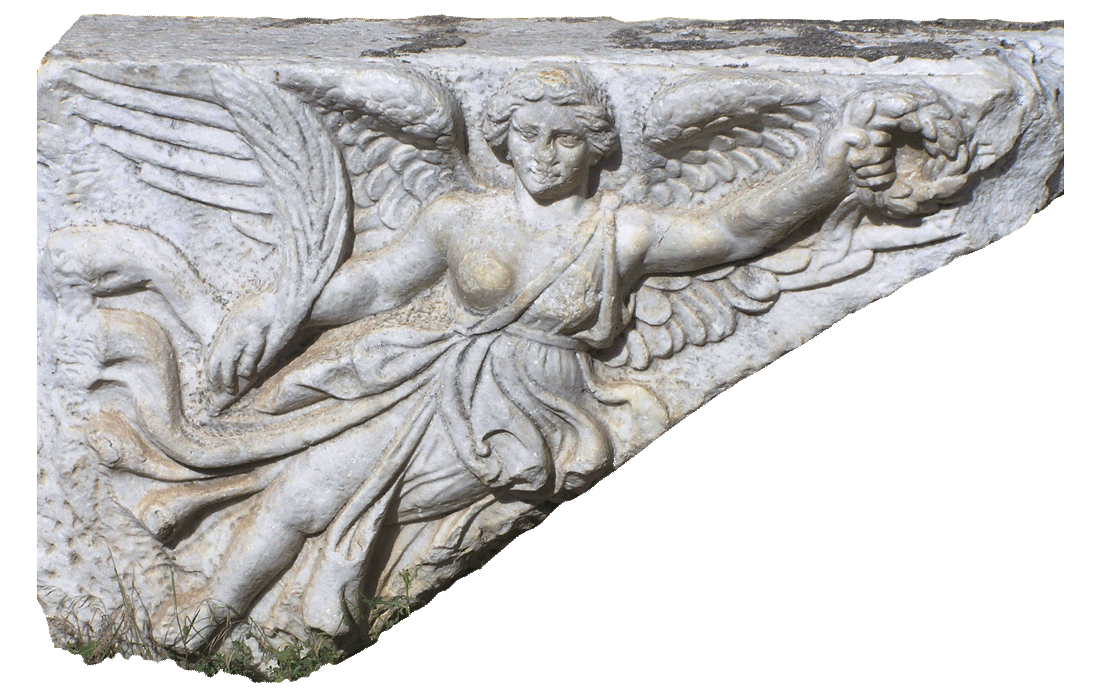Philippians
A Joyful Thank-You Letter
Central Teaching
In this personal letter, Paul thanks the Philippians for their generous support, gives them a personal update, and exhorts them to greater unity and joy in Christ.
Memory Verses
Setting
The apostle Paul likely wrote Philippians during his first Roman imprisonment around AD 60–62, perhaps near the end of his time in chains. He founded the church at Philippi on his second missionary journey (see Acts 16:12–40), and this church supported him financially more than any other (2 Cor. 8:1–5; 11:8–9; Phil. 4:10–19), staying loyal to Paul through the most difficult times of his ministry (Acts 16:19–24, 35–40; Phil. 1:29–30). While visiting Paul, Epaphroditus (a visitor from Philippi) became gravely ill and almost died (2:26–27, 30). After he recovered, Paul sent him back to the Philippians (2:26, 28–30), using this opportunity to say “thank you” to the Philippians through this pastoral letter.

A relief of Nike, the goddess of victory
Message
Many believers name Philippians as their favorite letter from Paul, for this personal correspondence to a group of close friends touches our hearts in many ways. Paul reminds his friends that although he is in prison, the gospel is not; God continues to work mightily in spite of Paul’s difficult situation. He thanks them for their generous support and exhorts them to live a life worthy of the gospel. In addition, he stresses the importance of unity by highlighting the humility of Christ, which produces unity within the church. Paul warns the Philippians against trusting in their own righteousness and directs them to rely on Christ’s righteousness on their behalf, challenging them to follow his example of forgetting the past and pressing on toward Christlikeness as they anticipate Christ’s return. Along the way, Paul offers practical insight on Christian living, such as choosing to rejoice rather than worry and making peace instead of grumbling.
Interesting Features
- In one of the most eloquent and powerful passages in the entire New Testament, Philippians 2:5–11 describes the humiliation and exaltation of Jesus Christ.
- Paul draws on Philippi’s special privileges as a Roman colony to emphasize the importance of our heavenly citizenship (1:27; 3:20).
- The theme of joy appears throughout the letter (“joy” in 1:4, 25; 2:2, 29; 4:1; “rejoice” or “rejoice with” in 1:18; 2:17–18, 28; 3:1; 4:4, 10).
- Philippians stresses the return of the Lord (1:6, 10; 2:9–11, 16; 3:20–21; 4:5).

The Via Egnatia, which passed through Philippi
Connections
There are numerous ways that Philippians applies to us. We can partner in the work of the gospel by supporting missionaries financially as the Philippians supported Paul. From the apostle’s example, we can learn to stay faithful in difficult circumstances and to rejoice that God is bringing good out of a tough situation. Philippians also reminds us of the importance of unity within the body of Christ—a unity that is made possible through our imitation of Christ’s humility and our service to one another (2:1–11). Lastly, the letter reminds us that we haven’t arrived in the Christian life. No matter what our past, we should neither be enslaved by it nor be overly confident in it. We’re still on a journey. Rather, we should obey God in our present circumstances, knowing that he is always working within and among us and that he has a wonderful future in store.